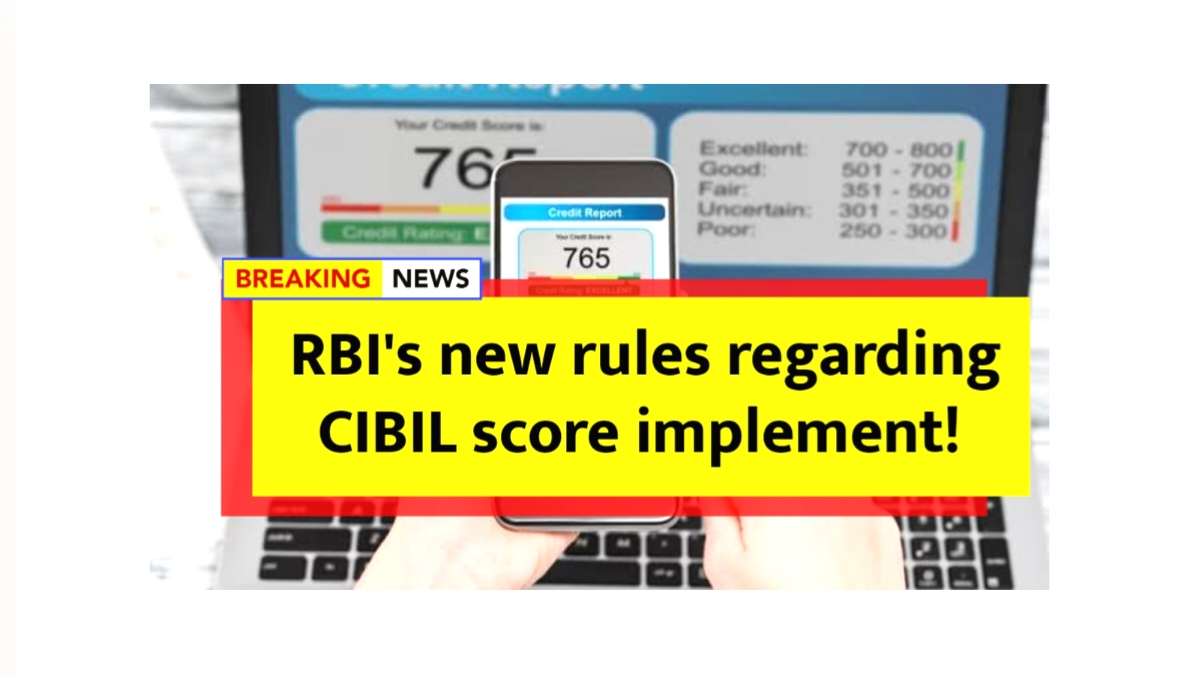Cibil Score New Rules: The Reserve Bank of India (RBI) has introduced new regulations regarding CIBIL scores, bringing significant changes to how banks and financial institutions handle credit ratings. CIBIL scores play a crucial role in determining a person’s creditworthiness and eligibility for loans. However, multiple complaints over misuse and lack of transparency have prompted RBI to step in and address these issues with strict new measures.
RBI Responds to Growing Complaints From Customers
Over the past few years, banks and Non-Banking Financial Companies (NBFCs) have been accused of misusing credit data and being non-transparent in their dealings. Customers frequently reported that their credit scores were being accessed or affected without proper notice. In response, RBI has formulated new rules that are now mandatory for all regulated financial institutions. Any violation of these norms will invite strict regulatory action.
Mandatory Notification When CIBIL Score Is Checked
According to the new guidelines, it is now compulsory for any financial institution or bank to inform the customer whenever their CIBIL score is accessed. This notification can be sent via SMS or email, depending on the registered contact method. This move ensures that customers are aware of who is checking their credit report, and helps in preventing unnecessary or unauthorized credit checks that could negatively impact the score.
Rejection of Loan Applications Must Be Explained
One of the major concerns among borrowers has been the lack of transparency in loan rejections. Under the new RBI rules, banks and NBFCs must now clearly communicate the reason for rejecting a loan application. Furthermore, each financial institution is required to submit a monthly report to credit bureaus, listing the reasons for loan rejections. This change empowers customers to identify issues in their credit profiles and improve them.
Right to Access Free Credit Report Annually
Another consumer-friendly move by the RBI is granting every borrower the right to receive one complete credit report free of cost each year. All credit bureaus have been instructed to provide a direct link on their websites through which users can access this report. With easier access, consumers can stay informed about their credit status and work proactively towards maintaining or improving their scores before applying for loans.
Mandatory Notice Before Declaring a Borrower as a Defaulter
As per the new framework, before labeling a customer as a loan defaulter, banks are required to inform them in advance. This notification must be sent via an official communication channel. Additionally, each financial institution must now appoint nodal officers specifically to address CIBIL-related disputes. This ensures that borrowers are not unfairly penalized or shocked by sudden negative reporting on their credit history.
Defined Timeline for Resolving Complaints
To streamline dispute resolution, RBI has now defined a strict timeline for addressing customer complaints related to credit scores. Banks must resolve any such complaint within 21 days or notify the credit bureau accordingly. Once notified, credit bureaus must act on the issue and provide a resolution within 9 days. In case of delay, a penalty of ₹100 per day will be levied on the responsible party until the issue is resolved.
Publication of Complaint Statistics for Transparency
In a move aimed at increasing transparency and public accountability, RBI has directed all credit bureaus to publish detailed data about customer complaints on their official websites. This data must include the number of complaints received, the nature of issues raised, and the time taken to resolve them. It will allow the public to make informed choices and identify which credit agencies are more reliable and responsive.
Customer Awareness and Institutional Accountability Strengthened
These new regulations are expected to create greater awareness among borrowers about how their credit information is handled. At the same time, they place greater accountability on banks and financial institutions, reducing the chances of misuse and arbitrary decisions. The RBI’s intervention ensures a more balanced and fair system where customer rights are protected, and financial institutions follow standardized procedures in dealing with credit data.
Disclaimer
This article is for informational purposes only. For detailed and up-to-date information, please refer to the official website of the Reserve Bank of India (RBI) or consult your respective bank or financial institution.

